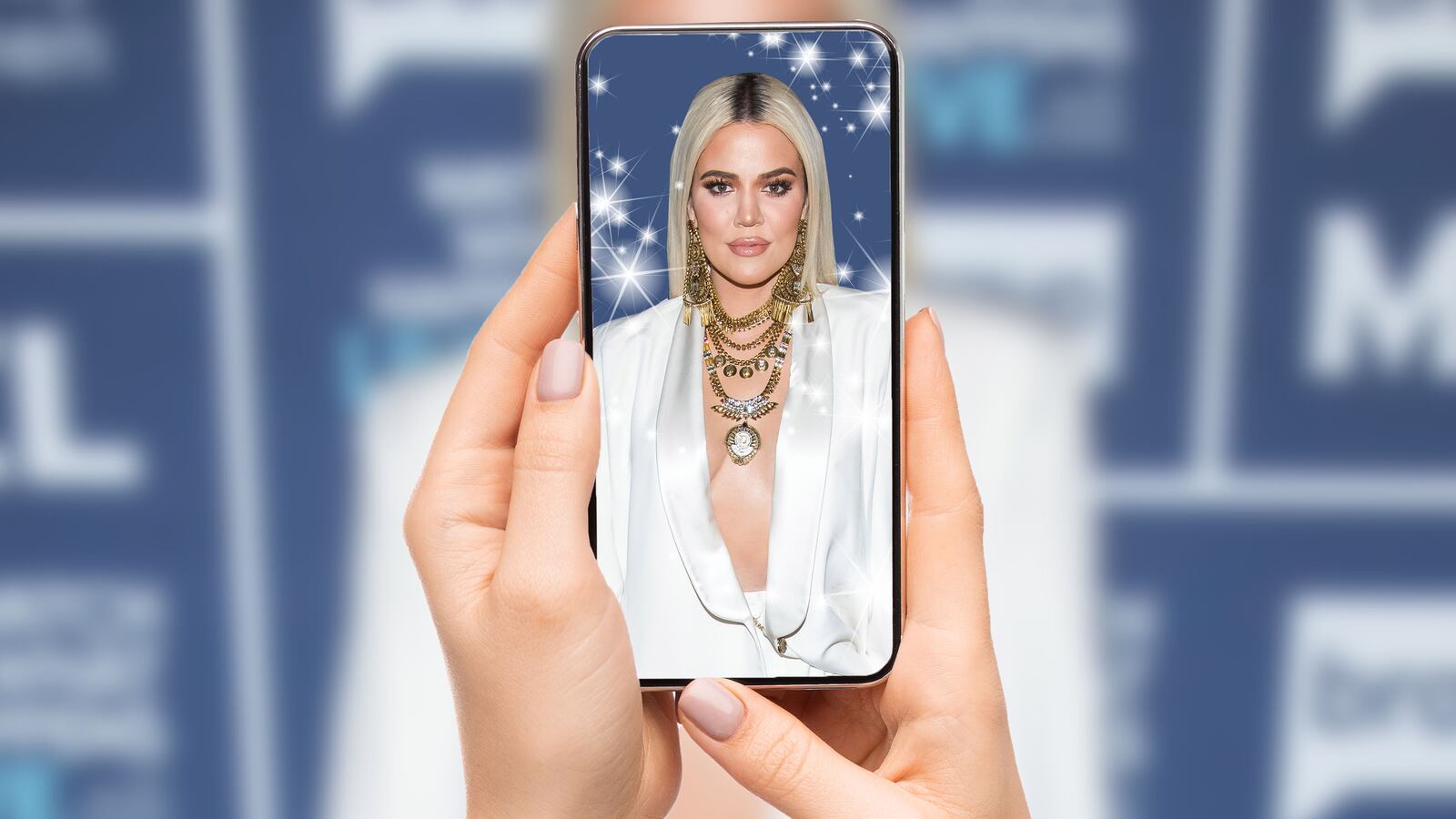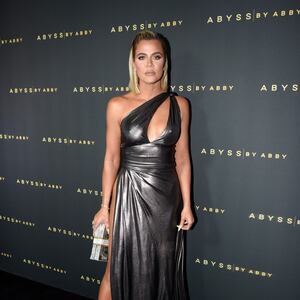By now, we’re used to members of the Kardashian-Jenner clan floating in and out of the news cycle for various Photoshopping mishaps and accusations that they promote unhealthy body image on social media, from sponsored waist trainers to diet lollipops. But few controversies involving the beauty moguls and their obsession with exhibiting physical perfection at all times have been as baffling as the fallout from an unfiltered photo of Khloé Kardashian that made the rounds this week.
The series of events leading up to the reality star and Good American founder addressing the matter in a statement and several Instagram videos on Thursday are as mind-boggling in detail as they are Byzantine in plot. Reportedly, on Easter Sunday, Khloé’s 86-year-old grandmother “MJ” Shannon snapped a casual photo of her 36-year-old granddaughter in a front of a pool wearing a bikini, without any noticeable filters or editing, which was accidentally uploaded to social media by an assistant. Not long after the photo appeared on Reddit and other websites, the family’s team of legal representatives went to work attempting to scrub the image from the internet. Several social media users claimed their accounts were locked and posts containing or about the photo were deleted. A Twitter user named @KosmeticKrys even posted screenshots of a Digital Millennium Copyright Act (DMCA) takedown notice she received in an email on behalf of an attorney representing the Kardashians.
Tracy Romulus, chief marketing officer for KKW Brands, released a statement to Page Six confirming the Kardashian team’s attempts to erase the photo from the internet, stating that “Khloé looks beautiful, but it is within the right of the copyright owner to not want an image not intended to be published taken down.” Of course, Khloé herself had to have the final word on the matter, posting a four-part statement to Twitter describing the ridicule she’s faced as the so-called “ugly sister” and the pressure she experiences to meet “impossible standards” of beauty and, ultimately, defending her right not to want a photo she didn’t consent to shared across the internet. Laced throughout these paragraphs is the insistence that, regardless of what she looked like in that unedited photo, the body she presents on her social media is real. Likewise, on Instagram, she accompanied the statement with several videos showing off her figure to prove her body “isn’t photoshopped.”
“I love a good filter, good lighting and an edit here and there,” she said in the statement. “The same way I throw on some makeup, get my nails done or wear a pair of heels to present myself to the world the way I want to be seen and it’s exactly what I will continue to do unapologetically. My body, my image and how I choose to look and what I want to share is my choice. It’s not for anyone to decide or judge what is acceptable or not anymore.”
While the comments on Khloé’s posts were flooded with a litany of ‘You go, girl’s and ‘I love you’s from fans and, of course, her celebrity coterie, others noticed the dissonance between the reality star’s legitimate claims of victimhood regarding her treatment in the media and her need to convince naysayers that the immaculately toned and curvaceous body she displays on her Instagram is, in fact, hers—along with the rationalization that she’s “work[ed] so hard” for it.
Obviously, Khloé and her family’s widely influential role in perpetuating the unrealistic beauty standards she describes as “unbearable” warrants additional pause. Namely, Khloé, Kim and their half-sister Kylie Jenner have been called out over the past few years for advertising waist trainers, weight-loss shakes, detox teas and other quick-fix products—most of which have been reported to cause health issues—to their millions of young, impressionable fans on social media, mostly girls and women in their teens and early twenties.
But like most corporate entities selling products to women over the past decade, the Kardashians have found ways to distort the increasingly accessible and marketable language of body positivity and self-care—as well as the concept of hard work—to frame achieving physical perfection as not only healthy but empowering. Accordingly, activists have decried the recent co-opting of once radical movements meant to liberate fat bodies from oppressive systems by clothing lines, fashion publications, diet programs and influencers like the Kardashians. Yet economic incentive always takes precedence over women’s actual needs.
The most glaring recent example of this pop-culture phenomenon actually involves Khloé and the makeover show she began hosting on E! in 2017 called Revenge Body. Inspired by her own weight loss journey in the public eye, the self-improvement show helps usually fat people lose weight and “enhance” their image with trainers and stylists. Like its Oxygen predecessor My Big Fat Revenge, the participants exact revenge on former partners, ex-friends, old bosses and other people who’ve fat-shamed them by presenting their transformations in-person accompanied by some sort of triumphant monologue. Becoming the version of yourself the cruelest people in your life want you to be is framed as ultimately positive because it involves labor and determination to get there. It also clearly involves time, money and resources, but that’s never emphasized on the program.
Likewise, in Khloé’s statement, her adherence to mentally and physically taxing beauty standards are justified by the assertion that she didn’t “[pay] for it all,” as in received surgery—a claim that’s been passionately disputed online. But regardless of whether she went to a surgeon, saw a nutritionist, worked out with a trainer or hired a personal chef, she did, in fact, pay for the way she looks in one form or the other. And the idea that “earning” beauty adds a layer of virtue or importance to it is capitalism doing its best work.
Still, the Kardashians can never disavow their own mythology no matter how ridiculous it makes them look in public because it’s what they’ve built their current careers on. Khloé’s genuinely sad admission that she mentally and emotionally suffers from the notions of beauty that her family has helped to construct has to be wrapped in a pretty bow of “hard work” and “choice.” And the reality star will continue to promote the painful task of attaining impossible beauty standards that even wealthy white women like herself are set up to fail.


